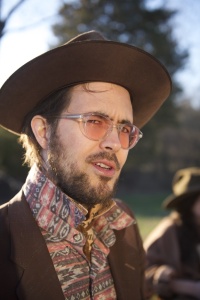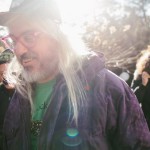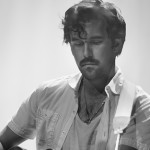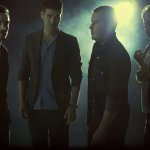By Emily Gawlak

[M]y first year of college, I saw Elvis Perkins at a tiny little venue in Charlottesville, Virginia called the Southern. He was with his band Dearland at the time, but some unfortunate hiccup involving, if I recall correctly, a non-life threatening van accident, delayed the band’s arrival. Undeterred, Perkins simply took the stage alone, and played his heart out — acoustically and intimately — to a crowd of maybe twenty people, tops. The long-haired, sad-eyed folk troubadour with his gentle, intoxicating poetry became an indispensable part of my musical repertoire back then, and when I saw him play at Williamsburg’s record store cum music venue Rough Trade a couple of weeks ago– this time, with a sold out crowd and a bevy of talented backing musicians– it took me back all those years, just like reconnecting with an old friend.
Taking the stage again was a reconnection for him as well. I Aubade, the full length album which came out in February of this year, and for which Perkins is currently on tour, marks the end of a six year lull in production, during which the performer engaged in art-related side projects, but took time away from personal writing and recording. I had the fortunate chance to pick the artist’s brain, and I was curious about what prompted his hiatus. Largely, he told me, it stemmed from his desire to be a self-made man. “For the bulk of the time going forward [from 2009’s release, Elvis Perkins in Dearland], I was just figuring out what record to make and how to make it myself. That entailed writing the songs and then learning to be a sound engineer, self-producer, self-editor, etc.” Calling the album, “surely the most hands on and experimental” in his oeuvre, the creation of I Aubade meant eschewing traditional studio recording methods in favor of a more simple and solitary method: recording in his home and even, occasionally, outdoors.
At Rough Trade, when Perkins took the stage with his guitar, harmonica, and backing musicians, a remarkable reverence spread like wildfire throughout the crowd– a rowdy bunch for the first two acts– and from the moment he strummed his first chord, the cavernous room fell dead silent, a stock still pause before Perkins’ plaintive tremelo filled the space. The stray outburst of “bravo!” or “beautiful!” that echoed towards the stage after most songs seemed more tailored for the Lincoln Center than a beer soaked indie venue near the Brooklyn waterfront. When I asked him about this phenomenon, Perkins replied humbly and humorously, “Perhaps there was audience concern for another half decade vanishing act so, while they could, they were taking it in as fully as possible.” While it is true that many fans, such as myself, have been waiting with bated breath for his musical return, there must be some other factor at play. “I gather appreciators of my work gravitate as much to the words as to the music,” he added, “so talking over/talking back might consciously be kept to a minimum.” Indeed, Perkins has a strange, hypnotic quality to his voice and his music, as if he’s whispering his songs in a secret hush, for your ears only to gather-up and decode.
From religious allusions to cultural and musical Easter Eggs hiding in his verses, Perkins places his work before you and suggests you take only what you wish. “I think it’s wonderful and beautiful that we are these roving wells of memory and association and dreams,” he muses. Dreams ebb and flow throughout his work so intrinsically, it may be apt to call Perkins a neo-surrealist, preoccupied, even obsessed with the interpretation of those shadowy, unrealized corners of our consciousness. His songs roam and race, both lyrically and sonically, unfolding uniquely upon revisitation. Bird calls, whistling winds, and cricket chirps fold whimsically into muted trumpets and jangling piano to create a lush, encompassing soundscape, more fully and at times, even overwhelmingly, realized on I Aubade than on his earlier records.
At times however, lucidness rises out of the swirl, and in his own way he teeters towards the politicized folk of his genre’s forebearers. In his words, “there is surely a range of both pointed and nebulous statements which respectively have greater and lesser chances of directing the consciousness of the listener. When suggesting in the song My 2$ that we “say so long Coca Cola…” my intention is for the listener to consider the power of their dollar in funding or refusing to fund irresponsible, iniquitous companies. With Hogus Pogus, though less pointed, my hope is some headway/heartway can be gained in acknowledging and revering the “humanity” of the animal kingdom and a step be taken towards the repudiation of the factory farm and animal abuse at large.”
When I pushed the artist about his process of creation, there was no simple answer. Some songs come to him immediately. Others– most others– take time. “I typically have songs gestating over years,” he wrote. Despite this, and despite the fact that he picks up side projects as he goes along, such as one he is currently working on with his brother, actor Oz Perkins, he assures me that his next album will not be too many years in the making. “There is surely infinite territory to explore and I’m confident I’ll release the next thing without such an extended lacuna.”
“& Eveline” is a track from Elvis Perkins’ latest album that perhaps most directly references the titular aubade, which is a poem or song that tells of lovers parting at dawn. Perkins sings, “O, say what you’ll say/ O, honey I’ll translate it, O/ the morning from night.” He embraces the role of the interpreter, offering us his gift for spinning fine poetic threads to interlock impossible opposites that swirl around us: personal and political, happiness and grief, waking and sleeping, reality and… something just a little bit more.







Be the first to comment!